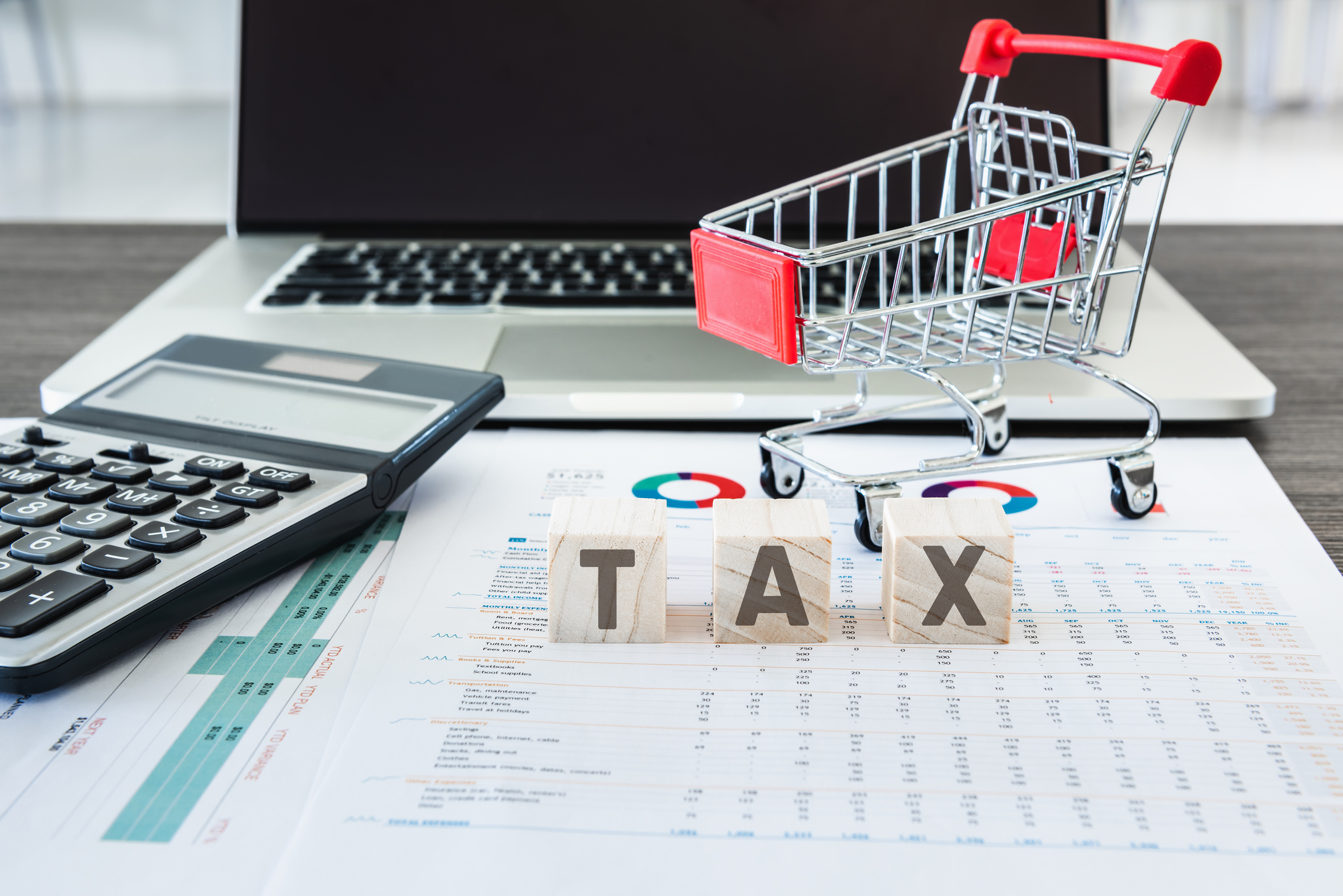
Marketplace sales are booming.
In his April 2019 annual letter to shareholders, Amazon founder and CEO Jeff Bezos noted that marketplace sales comprised 3% of Amazon’s sales in 1999, and a whopping 58% of its sales in 2018. In his words, “Third-party sellers are kicking our first-party butt. Badly.”
No wonder states are intent on taxing marketplace sales.
Almost all states with a general sales tax have laws in place to tax remote sales. To survive and thrive in this environment, marketplace sellers need to understand sales tax, how it’s changing, and how it affects them. Let’s break it down.
First things first, let’s explain what sales tax is.
Sales tax is a tax that is paid to the government for the sale of a certain item or service.
There’s a lot that you need to know about sales tax especially if you’re a marketplace seller.
It used to be widely believed that internet sales were sales tax exempt. That’s always been a fallacy unless sales occurred in one of the few states with no general sales tax: Oregon, New Hampshire, Montana, Delaware, and Alaska (though many jurisdictions in Alaska have a local sales tax).
All states with a general sales tax require you to obtain a license before doing business in the state. In the event you’re not required to collect sales tax, tax still applies unless the sale is statutorily exempt — as is most (but not all!) clothing in Pennsylvania. If a seller doesn’t collect sales tax on a taxable sale, the consumer generally owes the state the equivalent consumer use tax. Unfortunately for states, not many people realize they’re required to pay consumer use tax, and it can be challenging and expensive to enforce.
Internet sales have never been tax free just because they occur online. However, states can’t require a business to collect and remit sales tax unless that business has sales tax nexus with that state.
| Related: Interested in selling your craft online? Learn how to sell on Etsy! |
Nexus is the minimum connection between a state and a business that allows the state to require the business to collect tax on its behalf.
For decades, sales tax nexus was based solely on physical presence. States couldn’t require sellers based in other states to collect sales tax unless they had some sort of physical presence in the state, such as employees, inventory, property, or sales representatives.
To capture more sales tax revenue from remote sales, many states have broadened the definition of physical presence to include ties to affiliates (affiliate nexus), or referrals from in-state entities (click-through nexus). Trade show attendance is another common nexus trigger.
Meanwhile, several states challenged the physical presence rule. South Dakota enacted a law whereby a remote seller’s economic activity in the state triggered a sales tax collection obligation. The ensuing case made it to the Supreme Court of the United States, which ruled in favor of the state in South Dakota v. Wayfair, Inc. (June 21, 2018). Physical presence in a state still establishes nexus, but now economic activity in a state where there’s no physical presence can too (economic nexus).
More than 38 states have economic nexus laws on the books. While similar, each law is unique. For example, economic nexus is established in California when an out-of-state seller makes than $500,000 in sales of tangible personal property in the state in the current or previous calendar year. In New York, an out-of-state seller must have more than $500,000 in sales and more than 100 separate transactions of tangible personal property in New York in the immediately preceding four sales tax quarters to establish economic nexus.
| Related: Find out where you’re at risk for nexus with this free sales tax nexus tool. |
Economic nexus laws can affect any remote business that makes sales in the state — individual sellers or marketplace facilitators like Amazon or eBay. But since all state economic nexus laws allow an exception for small sellers, they may not apply to smaller marketplace sellers.
In other words, although states now have the authority to tax remote sales, many are still going untaxed.
A growing number of states are changing that by requiring marketplace facilitators to collect and remit sales tax on behalf of their third-party sellers. In this scenario, the marketplace facilitator is the seller liable for tax on all sales made through the marketplace, even those by remote marketplace sellers that don’t meet the economic nexus sales threshold.
States with such marketplace facilitator sales tax laws include Alabama, Arkansas, California, Connecticut, Hawaii, Idaho, Indiana, Iowa, Kentucky, Minnesota, Nebraska, New Jersey, New Mexico, New York, North Dakota, Oklahoma, Pennsylvania, Rhode Island, South Carolina, South Dakota, Virginia, Washington, West Virginia, Wyoming, and Washington, D.C. The laws in some of these states won’t take effect until later this year, which is why Amazon currently collects tax on behalf of marketplace sellers in only 22 states and the District of Columbia.
Similar legislation is under consideration in many other states, including Arizona, Arkansas, Colorado, Maine, Massachusetts, Missouri, and Virginia. The trend is undeniable: States want marketplace facilitators to act the tax collector for all sales made through the marketplace.
However, individual sellers may still have certain sales and use tax obligations even when marketplace facilitators are liable for sales tax.
For example, Connecticut requires marketplace sellers that exceed the state’s economic nexus threshold to register and file an annual sales tax return with the Connecticut Department of Revenue. They’re required to report all Connecticut sales and should deduct marketplace sales if a facilitator collected tax on their behalf.
Additionally, states that require marketplace facilitators to collect sales tax on behalf of sellers only hold them responsible for the tax on sales made through the marketplace. If you sell into a state through multiple channels, including a non-collecting marketplace or your own e-commerce store, you may be liable for the tax on those sales.
In Iowa, a seller that only makes sales through a collecting marketplace isn’t required to obtain an Iowa sales tax permit or file Iowa sales tax returns. However, a seller that makes marketplace and non-marketplace sales must report all sales into the state and take a deduction for sales that were taxed by a marketplace facilitator.
In other words, it’s not as simple as “I don’t have to worry about sales tax if I sell through a marketplace.”
You need to deal with sales tax if you’re in the business of making sales, and you can’t comply with sales tax laws unless you know about them.
Sales tax laws are state-specific, so if you do business in multiple states, you need to track rates, rules, and regulations in multiple states. State departments of revenue can provide a wealth of information, but it’s not always at the fingertips. Familiarize yourself with these websites, and where possible, sign up to be notified when sales tax requirements change.
One of the most challenging aspects of sales and use tax is its inconstant nature. Multiple sales and use tax changes are proposed in most states each legislative session and some invariably become law. To keep your finger on the pulse of sales tax in states where you do business, keep an eye on sales and use tax legislation.
Finally, you may want to consider sales tax compliance software. It can shoulder as much or as little of the burden of sales tax compliance as you need.
When it comes to marketplace sales, make sure you understand how sales tax applies to your purchase! And of course, don't let it hold you back from getting out your wallet and buying the exact item you've been searching for.
Learn more about selling online with our roundup of the ten best online marketplaces for e-commerce professionals!
Gail Cole has been researching and writing about sales tax for Avalara since 2012. She has a penchant for uncovering unusual tax facts and endeavors to make complex sales tax laws more digestible for experts and laypeople alike.
With the crack of a gavel in June of 2018, the United States Supreme Court reached a...
 by Alex Forbes
by Alex Forbes
More than 140,000 third-party sellers made more than $100,000 in yearly sales this year.
 by Deirdre O'Donoghue
by Deirdre O'Donoghue
If you want to produce higher sales while working fewer hours, your first move should be...
 by Andrea Moxham
by Andrea Moxham
With the crack of a gavel in June of 2018, the United States Supreme Court reached a...
 by Alex Forbes
by Alex Forbes
More than 140,000 third-party sellers made more than $100,000 in yearly sales this year.
 by Deirdre O'Donoghue
by Deirdre O'Donoghue


